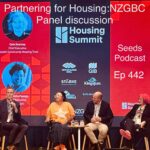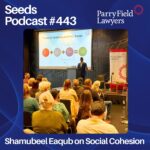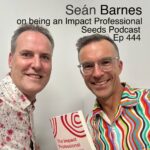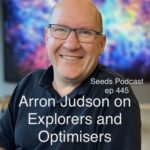Samantha Jones gave the last word at the Aotearoa Social Enterprise Forum held on 19 October 2018 in Wellington. The full transcript is typed below. She brought some truths to the table that deserve to be heard such as “Leave ego behind. If you really want to influence people let your actions speak for themselves.” This is a challenge for change and action over complacency and not focussing on the image without the substance to back it up. She also talks about how hard the journey actually is which is something we don’t do enough of. I am releasing this less than 24 hours after she gave the talk because I think it is important for all those who could not make it to the conference to also hear this message and the many challenges it contains. If you agree then consider sharing it with others who would appreciate it.
Samantha is a previous podcast guest and her full journey is in that episode here: http://seeds.libsyn.com/samantha-jones-on-sustainable-fashion-and-founding-little-yello-bird
More on Little Yellow Bird: https://www.littleyellowbird.co.nz
Here is the full transcript of what she said:
Tena tatou te whanau
As today draws to a close I hope that everyone here has had the opportunity to learn, connect and be inspired by all the amazing entrepreneurs and change makers that we have here in Aotearoa.
But the challenge that I want to lay down now is for us not to just talk about social enterprise but to focus on growing effective organisations that are actually addressing and preventing those issues that are so critical to our very survival.
As you might know social enterprises are all the rage at the moment and it is tempting to try and apply social enterprise thinking to almost any idea. But as we become more sophisticated as a sector it is becoming increasingly important that we not only understand who we are, but who we are not. We need to understand which social enterprise solutions actually make sense and are needed – what are the boundaries of social enterprise – and how can we foster a culture that encourages us all to learn from our own and each others mistakes. More than ever before we need to move beyond that mythical and invisible impact both in our personal lives and in the organisations we are running. More of us should be asking, is this actually adding value, or does it just spin a good story. Do we want stainless steel straw companies with a side of social enterprise. Or do we want organisations that are genuinely committed to ending ocean plastic not just the tiny percentage that straws represent.
The practise of social enterprise is often very different from the stories that we tell and the truth is it is often hard work. You are often judged not only on your business acumen but also on the impact that you are making. Often by people that don’t have much of an understanding on either of those things themselves. I think most people expect it to be hard, and I definitely don’t want to put anyone off – but what no one tells you is that it continues to get harder. I kept thinking that when Little Yellow Bird got to a certain size or a particular level of turnover or reached a specific milestone that things would get easier but they don’t. They do just keep getting harder.
But building a social enterprise teaches you a lot of things. Most of all you learn about perseverance and how to keep summoning that last iota of inspiration that carries you and your team through each day. Things never get easier but you do get better at dealing with it. So I hope today has been filled with learning, inspiration and opportunities to scale your impact whether this is in your own business, a corporate organisation that you work for or in your own life. Each and every one of us in this room has the power and the privilege to scale their impact. So if you are just starting out on your journey look at the small wins and easy transitions that can be made immediately to start living more impactfully. Look at those serial offenders and slowly start to remove each one from your life. It might be disposable coffee cups this week, plastic bags next week. Achievable goals so that the habit sticks.
But if this is already your normal how can you challenge yourself and others to do more. Are you willing to transition to a predominantly plant based diet, or utilise public transport more or refuse all single use plastics? How many of us are willing to stand here today that we care about climate change but then drive home for a steak, or fly home across the country and drink coffee from a disposable Air New Zealand cup. An even easier solution is just to be more aware about what you are consuming and how much waste we generate daily, weekly or even yearly. Before buying things when did you last stop to think whether you really needed it? If you don’t need it, don’t buy it. This is the single most impactful thing that individuals can do. It stops waste before it begins and it places importance on quality products that will really last. Fast moving consumer culture won’t exist in a sustainable world. And society is running late to that train as the UN has recently reminded us.
I’m not perfect at all of this and you don’t have to be either. But it is just about continuous improvement. We have talked a lot about social enterprise today. But it is going to be completely meaningless if we do not transition from talking about it to actually doing it. If we genuinely want to solve some of these pressing issues – and I think everyone in this room does – then we need to create the conditions in which social enterprise and social enterprise thinking becomes the norm, and fast. But I am likely preaching to the converted here and so in order to achieve these changes at the scale and pace that we so desperately need, we are going to have to take this conversation beyond these walls. The mindset shift that is especially needed in more traditional businesses. Imagine if everyone attending this conference played a pivotal role in transforming one existing business that they touch. How might this grow the sector, and shape the future of Aotearoa for good?
There is much to do in order to achieve this and as social enterprise leaders we need to be able to set good examples and carve the path for others to follow in our footsteps. We need to ensure that those painful roads that we have travelled are easier journeys for those travelling along behind us. And we have a duty to create the conditions whereby competitors can become collaborators when we are working towards the same end goal.
To conclude I wanted to share some key pieces of advice that I am lucky enough to have been given on my own social enterprise journey.
Identify what winning looks like. To maximise impact and minimise wasted effort you have to identify and understand exactly where you are going and make sure that the people on your journey understand it too.
Find the best people and set them free. Don’t work with people that think like you. And ideally work with people that think better than you.
Always set a clear vision but create the environment in which others can dictate the path to get there and then celebrate their successes.
Leave ego behind. If you really want to influence people let your actions speak for themselves. It is a timeless adage and it still holds true today – if you are awesome at something then you don’t need to tell everyone about it, because they already know.
We all need to stop competing and telling the world about the thing that we are doing so we can focus on the thing.
Speak up. People need to know two things – where you stand on a topic, and where they stand with you.
Trust your gut, it is almost always right.
And finally, never underestimate the power a few committed people to change the world. Indeed, it is the only thing that ever has.
You can download this episode here.
